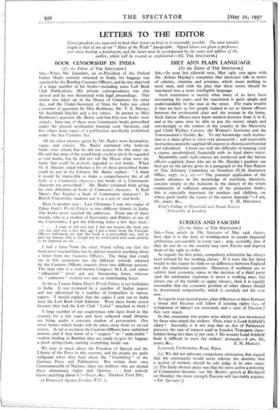DIET AN) PLAIN LANGUAGE [To the Editor of THE SPECTATOR.]
SIR,—In your last editorial note, May 14th, you agree with Mr. Arthur Hayday's complaint that dieticians talk in terms of calories, vitamins and proteins, which mean nothing to most men, and with his plea that these terms should be translated into a more intelligible language.
Such translation is exactly what many of us have been attempting for years, and the translation is quite simple and understandable to the man in the street. The main trouble is that we have so few people trained to act as liaison officers between the professorial chair and the woman in the home. Such liaison officers must know modern dietetics from A to Z, and at the same time be able to put the matter simply and convincingly to the women of the country in the Maternity and Child Welfare Centres, the Women's Institutes and the Townswomen's Guilds, &c. To my knowledge such instruc- tion as is there given is often very amateurish ; and reasonable instruction cannot be supplied till courses in dietetics are founded and subsidised. I know too well the difficulty of keeping such a course, unsubsidised, financially with its head above water.
Meanwhile until such courses are instituted and the liaison
officers supplied, those who are in Mr. Hayday's position can best act on the advice given in a paragraph of the First Report of The Advisory Committee on Nutrition (H.M. Stationery Office, 1937, is.), viz :—" The practical application of the recent advances in the knowledge of nutrition, therefore, consists simply in the inclusion in the dietary of the whole community of sufficient amounts of the protective foods ; this is especially important for mothers and children, on whose, good health the future of the nation depends."—I am, King's College of Household and Social Science (University of London).














































 Previous page
Previous page